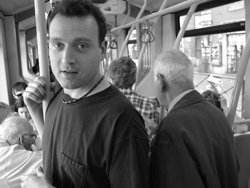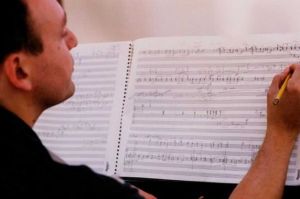There was only one glaringly unfortunate moment at last week’s Evolution Series concert: The Music of Derek Bermel – I had to leave early. (I know, sorry for the setup.) In the short time that I was there, I was able to partake in the pre-concert lecture and the first musical work. That was enough to know that I was missing out on a very special evening of music. Evolution Series is a gem of a concert series here in Baltimore. This year’s season has been a treasure trove of masters in the new music field: Alex Ross, David Lang, International Contemporary Ensemble, as well as last week’s Derek Bermel.

Bermel, composer and clarinetist, studied all over the world and his musical work draws from many genres, including classical, jazz, pop, rock, blues, folk, and gospel. Bermel’s interest in ethnomusicology drove him to seek out multi-cultural musical experiences. In his pre-concert lecture, Bermel mentioned being inspired by Kodály’s recordings of folk songs which led him to studying with André Hajdu in Jerusalem, Nicola Iliev in Bulgaria (Thracian folk style), Julio Góes in Brazil (caxixi), and Ngmen Baaru in Ghana (Lobi xylophone.)
Along with all of this travel and culturally diverse music study, Bermel has been busy stateside as well. Taking up posts as Artist-in-Residence at the Institute for Advanced Study in Princeton; Creative Advisor to the American Composers Orchestra at Carnegie Hall; and Composer-in-Residence at both Los Angeles Chamber Orchestra and Albany Symphony Orchestra must be overwhelming. Alas, Bermel finds time to also perform his clarinet concerto with over a dozen orchestras and continue composing his music theatre composition “Golden Motors.” I will not pretend to know how he does it all, but you know the cliché: when you find something you enjoy doing – it doesn’t feel like work. After listening to Bermel speak about his life and work, it seems as though he enjoys every minute of it – even the challenges.
You are probably thinking to yourself, “Sybaritic Singer, reviewing a week-old performance? Really?” To which I say, “I’ve been busy.” However, I simply wanted to write about what truly stuck with me. Although I am sorry to have missed most of the music on the concert, I am so happy that I caught the pre-concert Q&A. It was his discussion about challenges that has been quietly tumbling around in my head this last week. Bermel told a story about studying Lobi xylophone in Ghana. Taking lessons from someone with whom you do not share a common language is difficult enough. Nevertheless, there he was in a different country, trying to figure out a new instrument by playing a basic phrase, and a women walks by. While passing she started to dance to the phrase he was playing. To his surprise she was dancing to the offbeat. Bermel had an epiphany moment: he was learning the instrument the wrong way. He wasn’t playing the rhythms of that musical culture. It changed his perception of the lesson and the instrument. Then, he said what I have been thinking about this whole week, “transformative experiences come through cognitive differences.” Every change is a shock. A shock to the system that awakens it to a new outlook – a new status quo. The fact that the cognitive differences one experiences in day-to-day life are leading to a paradigm shift, is almost comforting. It encourages one to embrace those challenges in an effort to learn and grow. Obviously, this is not an entirely new concept. All the same, it takes a few hearings to make it stick.
[youtube=http://www.youtube.com/watch?v=zmCb5oO3d-o]
In his opening remarks, Judah Adashi said, “Derek Bermel is often called ‘eclectic’ but he is eclectic in the best possible sense of the word.” I was fortunate to benefit from his eclecticism in his words as well as his music. He presents a lovely synthesis of cultures, languages, and genres to a contemporary audience that feels at home with such interdisciplinary and multi-ethnic values. Bermel even mentioned, “new music can be too serious. We need to be soulful and fun too.” The first piece of the concert, Twin Trio (2005), was just that. Commissioned by a consortium of flute, clarinet, and piano ensembles. Bermel’s close friend recently gave birth to twins, and this piece is written in honor of that event. The whole piece runs like two young children jaunting and cavorting about. The second movement, converse, was enjoyable because it had the very element of twins making up their own language represented by the exchanges between the flute and clarinet. The beauty of Bermel’s language here is that it isn’t “invitation only.” The entire piece was approachable, yet evocative. Especially interesting was the fourth movement, follow. In this final movement, Bermel employed a cannon at the sixteenth note that was quite exciting to hear. All three players were on top of their counting game, to say the least.
I wished that I could have heard the final piece on the concert, Sound Garden (2000.) I kept hearing great things about it before the concert. However, I feel confident that I got more than the price of a ticket out of the part that I attended. It’s amazing where you can find inspiration these days, huh?

Well, Sybaritic Faithful, there is a very exciting rest of the week ahead of us. I will be in the audience at quite a few performances in the coming days. Hopefully we can run into each other at Peabody’s double-bill of 20th-century operas, Francis Poulenc’s Les mamelles de Tirésias and Maurice Ravel’s L’enfant et les sortilèges, with the Peabody Concert Orchestra, conducted by Hajime Teri Murai. Perhaps you will also be as excited as I am to attend The Baltimore debut of LotUS at the Windup Space on Sunday? (If you’re there – tweet me @mezzoihnen)
What will you be attending this weekend? Tell me all about it in the comments below!

[…] in performance: The Music of Derek Bermel (sybariticsinger.wordpress.com) […]